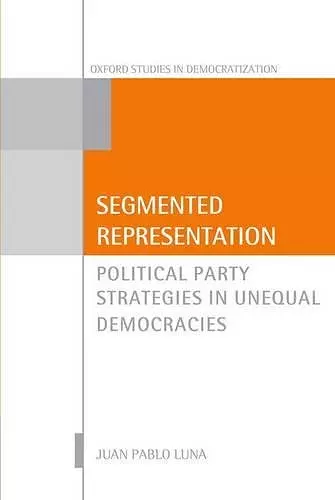Segmented Representation
Political Party Strategies in Unequal Democracies
Format:Hardback
Publisher:Oxford University Press
Published:17th Apr '14
Currently unavailable, and unfortunately no date known when it will be back

Millions of enfranchised people live in abject poverty in democracies around the world. Yet in representative democracies, the success or failure of political parties rests on their ability to effectively engage voters. In today's highly unequal and individualized societies, the diversity of voters along socioeconomic, religious, and other lines presents an obstacle for parties vying for electoral success. How, then, can widespread, crushing poverty still exist in stable democracies, if every citizen has a vote? Two wildly different parties, Chile's right-wing UDI and Uruguay's left-wing Frente Amplio, have achieved stunning victories in this supposedly inhospitable political landscape. They have done so by simultaneously segmenting and strategically harmonizing their linkages to distinct cross-sections of voters in each society. While that electoral strategy makes for a winning hand for parties in fragmented modern societies, it perpetuates the gross inequalities that characterize the social, political, and economic landscapes of the developing democratic world. This book develops a new analytical and conceptual framework to unveil and explain segmented representation, revealing new implications for democratic societies. Oxford Studies in Democratization is a series for scholars and students of comparative politics and related disciplines. Volumes concentrate on the comparative study of the democratization process that accompanied the decline and termination of the cold war. The geographical focus of the series is primarily Latin America, the Caribbean, Southern and Eastern Europe, and relevant experiences in Africa and Asia. The series editor is Laurence Whitehead, Official Fellow, Nuffield College, University of Oxford.
This is a path-breaking study of democratic representation in highly unequal societies. Juan Pablo Luna convincingly demonstrates that segmented societies create both incentives and opportunities for political parties'-on both the left and the right-to use different types of electoral appeals to attract distinct groups of voters. Drawing from survey data and field research in Chile and Uruguay, Luna shows how parties craft electoral strategies that combine programmatic, clientelistic, and personalistic linkages to voters, allowing them to generate support among heterogeneous but socially segmented constituencies. The result is a masterful analysis of how inequality structures democratic representation-and, ultimately, how democracy can reproduce social inequality. * Kenneth M.Roberts, Cornell University *
High levels of income inequality pose a challenge to politicians. They need to keep the rich happy to keep investment and donations flowing and the poor happy to secure their votes. How do politicians and parties reconcile the demands of these different constituencies in the most unequal part of the world? In this pathbreaking study, Luna suggests that they simultaneously deliver policies to the rich and pork to the poor. He supports his argument with rich empirical work drawn from the experiences of two new Latin American democracies, Chile and Uruguay, as well as other cases from the region and India. This book will be a must-read for students of representation, electoral behavior and political parties in established as well as new democracies, and will also prove invaluable to practitioners of approaches to empirical research that draw on mixed-methods. * M.Victoria Murillo, Columbia University research that draw on mixed-methods.M.Victoria Murillo, Columbia University *
Segmented Representation is one of one of the most important books on Latin American parties to be published in decades. Drawing on painstaking research in Chile and Uruguay, Luna shows that the kinds of programmatic appeal made by parties in advanced industrialized (and often taken for granted in theories of party behavior) are less viable in highly unequal societies, and that successful parties must make segmented appeals to diverse--even seemingly opposed--constituencies. The concept of segmented linkages will diffuse widely among scholars. Lunas work helps us understand why parties operate differently in a context of extreme inequality, while at the same time showing how segmented linkages work to reinforce existing inequalities. The book will make a major contribution to the study of political parties, not only in Latin America but throughout the developing world. * Steven Levitsky, Harvard University *
- Winner of Carlos Real de Azúa Award for Best Book by a Senior Scholar of the Uruguayan Political Science Association.
ISBN: 9780199642649
Dimensions: 239mm x 162mm x 29mm
Weight: 744g
402 pages